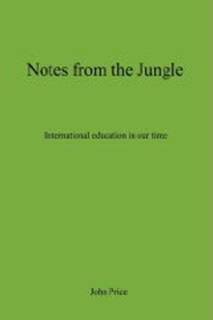|
 |
| Teachers.Net Gazette Vol.6 No.2 | February 2009 |
Subscribe for free home delivery |
|
Notes from The Jungle - International education in our time - Excerpt from the book | ||
| by John Price Author of Notes from The Jungle Continued from page 2 February 1, 2009 |
||
|
One exception is the International School of Geneva, which was established in the 1920s in the heady atmosphere of post World War pacifism. International schools have always sought to foster peace among nations. A few schools began in the parlours of principled English ladies, who, in the declining years of Empire, could not find a good local school for their own children. Alice Smith in Kuala Lumpur is an example, as is ELC in Selangor, Malaysia, founded much later, but on the same high minded principles. Many British international schools in South-East Asia started in the 1990s. They were the pet projects of successful business men who themselves had been educated in English public schools. What better legacy to their countries than a school? What better way of establishing their place in the pantheon of postcolonial endeavour? A few schools were the brain child of royalty; this was the case with JIS. In the 1990s senior managers from successful Asian companies visited English public schools to find out what made them tick. Consultative agreements were signed and the governing bodies entered into joint ventures with local partners, particularly in Malaysia and Thailand. Some of these agreements foundered after a short time; others flourished. The schools themselves usually survived, even if the heads and the agreements did not. Most are now well established and have impressive reputations. English public schools must now be wondering why they nurtured an incubus that may eventually devour them. The headmaster of a small Berkshire school, who visited JIS recently, was very impressed by the level of our funding. The flow of bright Asians to the shires may be slowing up as international schools provide a high quality education at home at a fraction of the price. Some English schools still trade in the well worn clichés of benevolent imperialism, but the rhetoric is wearing a little thin. The condescension is less apparent, but still implicit. The punters have grown more sophisticated. International schools chant the new mantra of internationalism and they seem fresher and more go-getting than the tired bastions of English privilege. There is little racism and no condescension. Since the British government started meddling in admissions, middle-ranking schools can no longer guarantee entry to the oldest universities. Some have lived a financially precarious existence for years now and may go to the wall. A number have already been forced back into the state sector as academies. International schools have begun to organise themselves into federations. In South-East Asia, British curriculum schools are members of the Federation of British International Schools of South-East Asia and East Asia (FOBISSEA). Other associations, such as the British Schools of the Middle East (BSME) and the British Schools of Latin America (BSLA) bring together heads and senior staff from those parts of the world. These organisations are young, but they are beginning to make a significant contribution to the debate about the nature and purpose of international education. Some are still at the stage of getting themselves properly constituted, although FOBISSEA is further ahead than most. In recent years the focus has been on sports competitions and music festivals, but the organisations are beginning to discuss more fundamental questions. International schools will have much to contribute to the process of achieving the goals of the United Nations in the fields of peace, development and human rights, while at the same time providing a high quality, broad, liberal education. The young people they turn out may well prove to be better equipped for a globalised world. | ||
|



 John Price never meant to be a teacher, but after a short stint as an accountant and rejection letters from the Foreign Office and MI6, he succumbed to the inevitable. But he never looked back. He taught at the Edinburgh Academy, Bedales, Winchester College, where he was Under Master, and then secured his first headship in Malaysia. There he helped to set up a new school in Lembah Beringin, 40 miles north of Kuala Lumpur. After that, he returned to Winchester, but soon got itchy feet again. He has been Headmaster of Jerudong International School in Brunei since 2004.
John Price never meant to be a teacher, but after a short stint as an accountant and rejection letters from the Foreign Office and MI6, he succumbed to the inevitable. But he never looked back. He taught at the Edinburgh Academy, Bedales, Winchester College, where he was Under Master, and then secured his first headship in Malaysia. There he helped to set up a new school in Lembah Beringin, 40 miles north of Kuala Lumpur. After that, he returned to Winchester, but soon got itchy feet again. He has been Headmaster of Jerudong International School in Brunei since 2004.